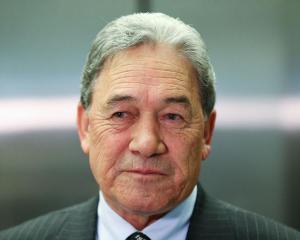
The foreign minister and a cross-party delegation of MPs are in Hawai'i on the second leg of their tour of the Pacific.
Peters told a gathering at the East-West Center there had been unfortunate and misguided debate recently about how international trade works.
He said military language was being used, including "trade war" and the "need to fight", which he said at times came across as "hysterical" and "short-sighted".
From Tonga on Friday, Peters criticised Prime Minister Christopher Luxon for talking with world leaders about the US tariff situation without consulting him in advance.
Peters spoke about New Zealand's commitment to the Pacific during a speech in Honolulu, Hawai'i.
"A core and enduring part of New Zealand's approach is our determination to work with our Pacific brothers, sisters and cousins to forge together a more secure, more prosperous and more resilient future, which grows opportunities and possibilities for our peoples," he said.
Peters said the meeting in Honolulu came at "an important, uncertain, anxious time in world affairs".
"Every day, we wake up to headlines about confronting events that are happening on the world stage. It is a common human tendency to think that the events or ravages of the moment are unprecedented. That the challenges we face are uniquely urgent or complex. Indeed, the most overused word in politics is 'crisis'.
"This, coupled with the hyperactive social media age we live in, can generate an urge to react too quickly and too stridently. To set out absolute principles to defend. To draw battle lines. To pick sides. To form teams. To fight."
He said that morning the delegation was hosted on the USS Missouri, "where the Pacific part of World War II formally came to an end" after "Our peoples have fought, and died, together in defence of a free, open and democratic region".
In the decades since, Peters said we "painstakingly [built] an international order based on dialogue, compromise, diplomacy and trust", preferring "jaw, jaw to war, war".
"In recent weeks, the tendency to hype up a debate about how international trade works into a black-and-white, polarising issue has been unfortunate and misguided. The use of military language - of a 'trade war', of the need to 'fight', of the imperative to form alliances in order to oppose the actions of one country - has at times come across as hysterical and short-sighted."
He said it was in New Zealand's interests, as a small country, to be "cautious, to be modest, to be pragmatic, and to be practical. To wait for the dust to settle before making choices we may later regret."
Last week, Luxon said the US' new - and changing daily - tariff regime was causing uncertainty and hitting people's back pockets.
"What actually is concerning me is the shift away from agreed rules and the risks of actually backsliding into a global trade war," Luxon said.
"A trade war is, frankly, in nobody's interest. It will slow global growth, it will hurt jobs and it will reduce the amount of money we have in our wallets."
'Confrontational and rude'
Peters acknowledged the US and New Zealand "have not always seen eye-to-eye" and that "US presidents have not always been popular back home".
"My view of the strategic partnership between New Zealand and the United States is this: we each have the right, indeed the imperative, to pursue our own foreign policies, driven by our own sense of national interest. But close friends do not need to be, and should not be, confrontational and rude with one another, as New Zealand sometimes was towards the United States in the mid to late 1980s.
"And we should never forget what binds and unites us, bonds stronger and more long-lasting than the controversies and headlines of the moment. We should give each other the benefit of the doubt and a fair hearing, seek to understand each other's perspectives, and find common cause and common purpose.
"New Zealand looks forward to working with the new US administration to support a peaceful, prosperous and resilient Pacific and wider Indo-Pacific region. We look forward to continue partnering across the interdependent areas of security, economics and development."













